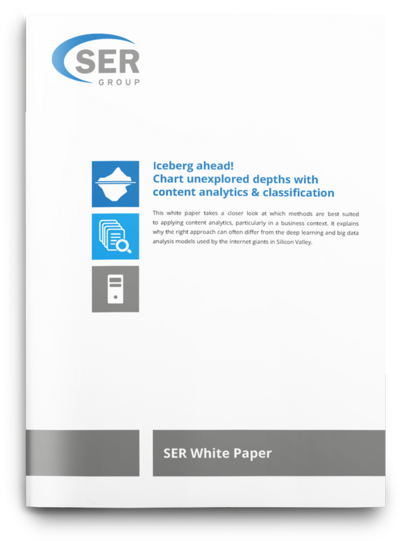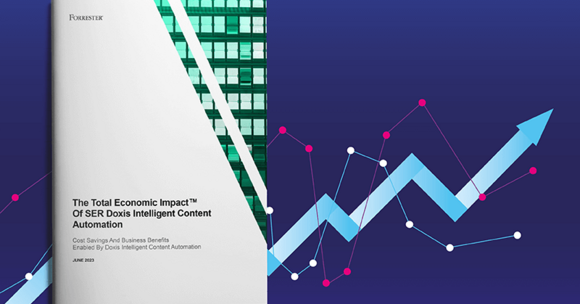SER Blog Innovation & Technology
How companies leverage data's hidden potential
Dominik Adams
Some 80 percent of all corporate data is unstructured: in other words, this data contains valuable information that remains untapped. To leverage this wealth of data, businesses rely on content services platforms that integrate AI into enterprise content management (ECM) and business process management (BPM) systems. This strategy has benefits for both businesses and their customers.

According to a 2018 study, 51 percent of organizations claim to be early adopters or sophisticated users of machine-learning technologies. Furthermore, another study found that companies assume that AI will change their industry greatly in the coming years. Yet only one in four large companies surveyed have developed an AI strategy. Why? Lack or poor quality of data and inconsistent legacy systems, in particular, are obstacles to successful AI projects, the study found. Without accurate data maintenance and integrated legacy solutions, smart technologies often provide incorrect results. It’s therefore no surprise that more than 70 percent of managers surveyed consider processing and use of data to be a big or very big challenge.

Leverage the potential of content analytics
Find out which content analytics methods work best for your company and how you can take advantage of them with enterprise content management.
Read nowCombining AI with enterprise content management
Companies have to respond to this challenge quickly if they want to exploit the potential of AI. In nearly every area of the business world today can AI be found: Particularly, AI in customer service, marketing and sales can help to increase revenue and customer satisfaction. For example, with AI, you can predict buying behavior and customer preferences and find the best-suited skill set for each customer request. To achieve this, however, companies must first analyze and process data from emails, web forms, chats and social media posts. In the meantime, according to Forbes, 2.5 trillion bytes of unstructured data are generated worldwide every day. However, in order to be able to make meaningful use of this data, organizations need a broad strategy to modernize IT systems and develop AI skills. For this purpose, it makes sense to combine artificial intelligence directly with information and process management.
Eliminating information silos
Often, however, companies suffer from IT sprawl and data is stored in isolated filing systems. When, say, email inboxes, email archives or ECM systems are analyzed using different services, content analysis is much more difficult. Only a content services platform that combines unified metadata management with comprehensive ECM and BPM functionalities, as well as integrated AI, can provide the basis for modern information and process management.
For example, content services platforms bundle information from multiple sources, prevent redundant data retention through deduplication, organize documents via versioning and metadata, and ensure comprehensive lifecycle management for documents. What does deduplication mean here? Here’s an example: After the software detects redundant files, it eliminates them and optimizes the capacity of the storage media. How about metadata? In this case, information about the data structure, file size, format or location is stored separately from the actual data in fast storage mediums and can therefore be retrieved at lightning speed. With these and other features, content services platforms provide the optimal conditions for significantly improving data quality.
Making unstructured data actionable
Data should always be cleansed of outdated, trivial or redundant information. With poor data quality, you always runs the risk that an AI system will not properly detect patterns and will thus draw the wrong conclusions. Structured data, mainly found in systems such as ERP, CRM or HR, is the easiest to work with: it can already be analyzed very effectively using machine learning methods. However, some 80 percent of all data is unstructured, e.g. texts, images, audio and video files of any kind, whether it be Excel spreadsheets, Word and PDF documents, emails, notes or logs. The analysis of this data can provide valuable insights – not least through the identification of personal data subject to EU GDPR requirements.
To use AI as effectively as possible, it makes sense to use a combination of machine learning and rules-based methods. Most companies do not have huge data pools like Facebook or Google. Instead of deep-learning systems, algorithms come into play that can also draw meaningful insights from manageable data sets. For example, new types of documents have to be identified and analyzed on the basis of a few examples – and a correspondingly small data set.
Automatically trigger the right workflow
Content services platforms with integrated AI demonstrate their strengths in particular through the processing, classification and distribution of incoming mail, emails or invoices. Image analysis classifies images or recognizes objects in photos. Receipts in the form of scans or photocopies can be sorted according to their layout characteristics. The layout classification also makes work easier for the responsible employee, as it automatically triggers the correct workflow for further processing. Even routine tasks such as tagging are omitted because metadata is added automatically.
Additionally, content services platforms are useful when analyzing texts. Once the contents of the various file formats have been extracted and processed for evaluation, text mining techniques are used and searches can be carried out in the right context. The metadata gives information about the content of a document or email – for example, if a customer has questions about a product or a specific contract.
Reliably forecast your prospects for success
With AI-based text analysis, it is also possible to classify content accurately, automatically assess customer feedback, and respond quickly. All this is possible because sentiment analysis is able to assess the emotional content of texts. Companies can treat critical customer emails with priority and automatically forward them to the responsible employee. The ability to analyze chats and social media posts, for example, is of immense value for sales and marketing. AI supports companies in determining, based on inquiries, offers and other data, which customers or leads are worth investing further time and energy.
As AI and ECM become more integrated, organizations will be able to make better decisions faster – thanks to AI-based content services, where data of any kind can be automatically assigned to a customer's file, project, or service process, and the information is made available on time and at the right place.
Free employees from routine tasks
A unified and intelligent content services platform relieves users of monotonous routine tasks, helps to speed up customer service response times and minimizes duplicate work. In addition, based on the skill sets, the system can suggest which tasks employees should focus on. It can also function as a personal assistant, for example, by pointing the employee to similar or supplementary content after a text analysis and recommending the right expert.
Summary
High data quality is the indispensable prerequisite for the use of artificial intelligence in companies. Enterprise content management and content services significantly increase the quality of data, ensuring that AI applications work as best as possible. Furthermore, the combination of ECM and AI optimally enhances process efficiency and employee productivity. Companies can extract meaningful information from content that originates from separate sources and automatically forward this information to the right applications. Defined workflows ensure that the right steps are taken and that the right employee is involved. Thanks to AI and ECM, higher data quality, better and faster business processes, and not least lower costs are attainable goals. Businesses should not hesitate to strategically integrate AI to unlock the many benefits of this technology.
Dominik Adams
Hi! I’m the Head of Product Marketing for the SER Group and a member of SER’s Innovation Team. Thus my daily business is talking and writing about some of my favorite topics: Technology trends and innovations, in particular those related to artificial intelligence, and finding ways to help our customers apply them in information management.

The latest digitization trends, laws and guidelines, and helpful tips straight to your inbox: Subscribe to our newsletter.
How can we help you?
+49 (0) 30 498582-0Your message has reached us!
We appreciate your interest and will get back to you shortly.




